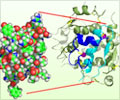Diabetics are twice at risk of dying following heart attack, but researchers aren't sure about the reason for the increased risk.

"Many studies have shown that patients with diabetes are at especially high risk for dying from a myocardial infarction (heart attack). Our study provides new evidence that this excess mortality could involve a pathway where oxidized CaMKII enzyme plays a central role," Mark Anderson, MD, Ph.D., UI professor and chair and executive office of internal medicine, and senior author of the study said.
Diabetes affects more than 8 percent of the US population, and heart attack is the most common cause of death in people with diabetes. Diabetes also causes increased oxidative stress - a rise in the level of so-called reactive oxygen species (ROS) that can be damaging to cells.
In 2008, Anderson's lab showed that CaMKII (calcium/calmodulin-dependent protein kinase II) is activated by oxidation.
The new study links oxidative stress caused by diabetes to increased death risk after a heart attack through the oxidation-based activation of the CaMKII enzyme.
"Our findings suggest that oxidized CaMKII may be a 'diabetic factor' that is responsible for the increased risk of death among patients with diabetes following a heart attack," lead study author Min Luo, D.O., Ph.D., a cardiology fellow in the UI Department of Internal Medicine said.
The study showed that heart rates in the diabetic mice slowed dramatically and, like humans with diabetes, the mice had double the death rate after a heart attack compared to non-diabetic mice.
Looking at the diabetic mice, the team found that pacemaker cells had elevated levels of oxidized CaMKII enzyme and more cell death than pacemaker cells in non-diabetic mice. The levels of oxidation and cell death were further increased in the diabetic mice following a heart attack.
The study is published in the Journal of Clinical Investigation.
Source-ANI
 MEDINDIA
MEDINDIA




 Email
Email










